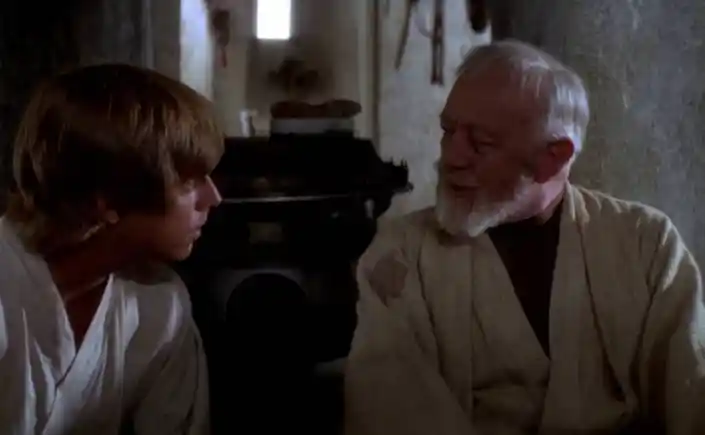Meaning Behind the Name “Obi-Wan Kenobi”: Explained

If there’s one character that was basically synonymous with the Jedi Order, it is Obi-Wan Kenobi, who was introduced as a wise old man that taught Luke Skywalker the basics of the Force during their short time together in ‘Star Wars Episode IV: A New Hope.’ His name, of course, is one of the most unique names in the entire Star Wars lore, a fictional world full of unique names. So, what is the meaning behind the name “Obi-Wan Kenobi?”
Obi-Wan Kenobi’s name was inspired by George Lucas’ love for Japanese samurai films. “Obi” means sash in a kimono, and “ken” is a Japanese word for sword. Meanwhile, “wan” resembles the Japanese honorific “san.” In that regard, his name was a combination of different Japanese-inspired words.
We all know that Obi-Wan Kenobi has always been one of the most iconic characters in Star Wars due to how important he was to the lives of both Anakin and Luke Skywalker. In that regard, he acts as the old and wise sensei that went through a lot but was still willing to impart his wisdom to others, just like there are wise old samurai in different samurai movies. That said, let’s look into the inspiration behind Obi-Wan Kenobi’s name.
Obi-Wan Kenobi name origins
In the Star Wars world, the one character that has always been constant in the lives of some of the most important protagonists of the continuity was Obi-Wan Kenobi. We know that Obi-Wan was the man that decided to take Anakin Skywalker on as his Padawan learner because his old master, Qui-Gon Jinn, wanted him to train Anakin as his dying wish because this boy was the Chosen One.
We also know that Kenobi never fell to the dark side, no matter how difficult his life had become. In that regard, Kenobi is a fan-favorite character that has inspired a lot of fans due to his valor, courage, and bravery as a Jedi.

But one unique thing about Obi-Wan was that he had a weird name that you don’t hear often. Of course, there are a lot of weird names in Star Wars, but Obi-Wan Kenobi’s name was one of the weirdest we’ve ever heard. So, where did the “Obi-Wan Kenobi” name come from?
Before we get there, it is best to remind the reader that Akira Kurosawa’s samurai films inspired George Lucas in relation to the Jedi. Of course, Lucas also incorporated Western gunslinger sci-fi into the storyline of Star Wars. That means that this entire storyline combines Lucas’s inspirations from both the West and the East. And the Jedi were mostly the ones that were inspired by his love for Japanese movies.
In Japanese, “obi” means sash, often used to tie a kimono. We know that the Jedi, especially Obi-Wan, wore a robe similar to a kimono. The word “ken” is also one of the words used for sword in Japanese. As such, the “Kenobi” name combines those two words.
Meanwhile, “Obi-Wan” was inspired by the Japanese honorific word of “san,” which is often used in conjunction with the name of a respected person. In that regard, the “wan” in Obi-Wan’s name was meant to be used in a manner that’s similar to the “san” honorific used in Japan.
That means that Obi-Wan Kenobi’s name was inspired by George Lucas’ love for Japanese culture and samurai films. That’s why Kenobi is also a man who is as close to a samurai in his approach to discipline and honor. And there’s no other character that’s more samurai-like in Star Wars than Obi-Wan Kenobi is.
In fact, in many ways, Kenobi is the wise old sensei that we often see in a lot of different Japanese films. He played the role of this sensei perfectly during the events of the original trilogy as he guided Luke Skywalker throughout the process of being a Jed. And we also got to see more of his sensei persona in the prequel trilogy, where he was seen taking on the role of Anakin’s master.
Why do they call Obi-Wan Ben Kenobi?
Another thing that people noticed about Obi-Wan was that he was named Old Ben Kenobi on Tatooine. In fact, when Luke heard the name “Obi-Wan Kenobi,” he wasn’t familiar with it but was familiar with Old Ben Kenobi, an old man living not too far away from the Lars family’s moisture farm. But we found out that Obi-Wan and Old Ben were just one person.
Many people might think that the Ben name was just a way of Westernizing Obi-Wan Kenobi’s name. But there’s a hidden meaning behind that name, which was revealed during the events of ‘Star Wars: The Clone Wars.’
In the events of ‘The Clone Wars,’ we got to see more of Obi-Wan’s life story as it was revealed that he had an old flame before he became a Jedi Knight. While he was just a Padawan, he and Qui-Gon Jinn were involved in a mission related to the Mandalorians and Duchess Satine Kryze. While Obi-Wan and Satine were traveling together for that mission, they fell in love with one another.

Of course, nothing came out of this mutual love for one another because Kenobi went on to be a Jedi who was prohibited from taking on a wife. Meanwhile, Satine became the leader of the New Mandalorians. But it was revealed in Jackson Miller’s novel about Obi-Wan Kenobi that the name “Ben” was a nickname that Satine gave him years ago when their flame burned at its hottest.
While that book was not canon because it was a Legends storyline, it was seemingly turned canon only insofar as the “Ben” nickname was concerned because Mike Chen’s Star Wars novel ‘Brotherhood,’ had an excerpt where Kenobi’s friend named Dex revealed that Satine actually called Obi-Wan “Ben” in the past.
In that regard, Kenobi took on the “Ben” name to remember his old relationship with Satine, who passed away before his eyes after Darth Maul murdered her in cold blood so that Obi-Wan would feel despair.
Of course, Obi-Wan Kenobi still loved Satine after all those years, as she was the only one he truly had romantic feelings for. And that was made clear by the fact that he used Satine’s nickname as his alias while living for nearly 20 years on Tatooine.
Have something to add? Let us know in the comments below!
Liked this article? Follow us on Facebook, Threads, and X to stay updated with the latest news.

